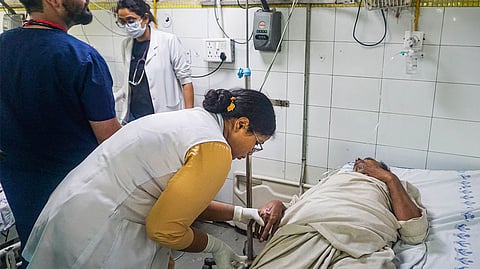

NEW DELHI: With the onset of extreme summer temperatures and a heat wave alert issued for Delhi-NCR, hospitals across the capital are preparing to tackle the anticipated surge in heat stroke cases.
Dr Ram Manohar Lohia (RML) Hospital, which had set up a dedicated heat stroke unit last year, has reactivated the facility in anticipation of rising admissions. Doctors at the hospital say heat stroke is becoming increasingly common in Delhi, and immediate intervention is crucial to avoid organ failure or death.
The hospital has restarted a special ward within its emergency department, equipped with two large tubs filled with 50 kilograms of ice each.
Patients suffering from severe heat stroke will be immersed in these tubs to rapidly reduce their body temperature, a critical step in preventing fatal complications.
According to government estimates, 25 patients lost their lives to heat stroke in the national capital last year. However, independent organisations claim the actual toll was significantly higher, estimating around 300 deaths.
While preparations are well underway at the RML Hospital, the situation at Lady Hardinge Medical College paints a different picture. Though a heat stroke unit has been set up in its emergency department, it remains non-functional. Doctors at the hospital cited technical reasons for the delay in launching the facility.
Delhi government hospitals, which cater to thousands of patients daily, appear ill-equipped to handle the expected influx of heat stroke cases.
Despite last year’s deadly summer, most of these hospitals have only stocked up on ice packs, with no comprehensive system in place to deal with severe cases. From May to July, hospitals usually witness a spike in heat stroke cases, and health experts warn that the lack of proper facilities could once again put lives at risk.
“Heatstroke occurs when the body temperature exceeds 104°F. The symptoms include confusion, dry and hot skin, rapid heartbeat and even seizures,” said Dr Mukesh Mehra, senior director (Internal Medicine) at Max Super Speciality Hospital.